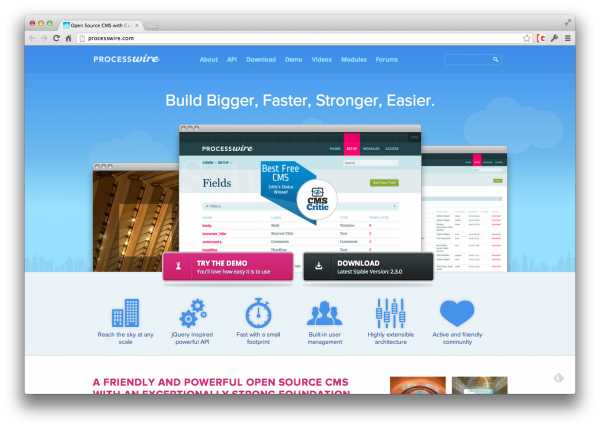Have you heard of ProcessWire?
I’ve heard of it a number of times as it’s crossed my desk and I’ve continued to ignore it somewhat as I’ve had more pressing things (get it…?) to attend to.
But the darn thing won’t die and keeps winning awards – so at long last I was able to sit down with it this past weekend and just walk through some of the demo videos and documentation.
The result? Mixed. But, comparing it to WordPress I’ve found a lot that I like about it, especially since WordPress has transitioned from calling itself strictly a blogging platform and moving into the CMS market strongly.
ProcessWire is open source and you can easily test it via your local machine, like using WAMP or MAMP:
- A Unix or Windows-based web server running Apache
- PHP version 5.2.4 or greater
- MySQL 5.0.15 or greater (later versions of 4.x may also work)
- Apache must have mod_rewrite enabled
- Apache must support .htaccess files
- PHP’s bundled GD 2 library
- PHP should support mysqli
I particularly like, most of all, their philosophy which they concisely state as Simple, Powerful, Consistent, Predictable, Capable, and Fun. When was the last time you included “fun” in your list of principles for a product? Oh yeah.
The long-form is as follows:
ProcessWire is designed to have an approachable simplicity that is retained regardless of scale. Simplicity often implies reduced capability, and this is not the case with ProcessWire. From the surface, there is very little complexity and the application requires no training.
But open the hood, and you have a lot of horsepower at your disposal for just about any content need. The goal is jQuery or Google-like simplicity, for lack of a better term (a simple interface to powerful engineering). Regardless of scale, the inherent simplicity and joy in using the interface and CMS API remains consistent, predictable, and capable.
Check out this video overview:
You may actually find much to love here in it’s presentation and use opportunities, especially if you have a mega-large hierarchy and organization, which WordPress can struggle with.
Here are a few live examples of sites using it to whet your appetite:
As you can see the usage is fairly free and open with a lot of sites that require a lot of hierarchy and taxonomy.
I’ll keep it on the shelf as an option for future use and I’m going to stay in the loop with development. Take a look and let me know your thoughts. Have you used it yourself?


3 Comments
Join the conversation